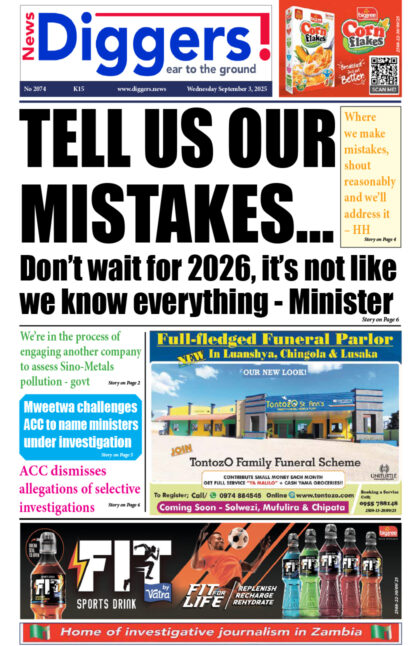FORMER Finance Minister Ng’andu Magande says government should come up with new ideas to revive the economy under the COVID-19 guidelines because citizens are still unaware of how Zambia’s economic recovery will be achieved.
In an interview, Magande urged the government to be more transparent in information sharing to enlighten the masses on how it intended to get Zambia out of the current economic crisis.
He cited economic data that had still not been available to him, among other stakeholders, who wanted to know what the government would do to revive growth amid the COVID-19 pandemic.
He also wondered why Zambia was among countries that were projected to fail to achieve one per cent growth when the country remained endowed with natural resources.
“The latest forecast by the International Monetary Fund (IMF) indicates out of all the African countries, Zambia is among four countries that is going to fail to get one per cent growth. Ethiopia and Sudan have internal wars. Congo has the same president for over 30 years. Why is Zambia in this team of non-performers? I was going through this and I thought, Zambia is a rich country. Why should we fail to get one percent growth? We have all this rain, what are we going to do with all this water? Is it to keep it in the Zambezi River for electricity, or can we do something different? The issue of saying, ‘agriculture can be our diversification tool’ can’t work if we don’t have new ideas on what we are going to do with the land and water that is available. If we just say, ‘we are going to give fertilizers…’ Fertilizers have been given all these years, but people still are producing 30 bags per hectare, which is very wrong,” Magande said.
“And unless we are coming up with new things under the COVID-19 restrictions and lockdown, people must come up with new ideas, what is going to happen, how are we going to move? It is nice to go at the market and give women money to grow tomatoes and if everyone is saying they want to be marketeers, who is going to be the producer of tomatoes?”
He said he needed to read the Economic Recovery Plan document launched last week but noted that what was lacking was sharing of information by the government.
“…somewhere in March, I read this issue when the IMF was here for consultation, I asked a simple question to the government office, who were in that meeting: ‘what are you going to do differently in spite of COVID-19?’ They said, ‘we have a plan’ and I said to the Minister who was there that, ‘can I have a copy?’ And up to now, I can’t get a copy. Now, if people who are interested to look at how things are being done are not assisted with information, who are these people who are going to move the country? So, we still have something lacking somewhere. I read the summary by the President that we want everybody to be there, I am one of the 17 million (citizens) and I take keen interest in what they are supposed to be doing, and I don’t know where to get this information,” Magande said.
He said there was a problem if citizens did not participate in the country’s economic recovery process.
“If you are relaunching and driving at 60 kilometers per hour, and you are driving perhaps for three hours, you know that your fuel has gotten less, if you are relaunching, is there a fuel station nearby where you can get more petrol? Because if you start driving at 100, the engine will consume more and you may not even reach where you are going. So, the relaunching from where? Where are we now and what has made us to be where we are for the kwacha to go to K21 per dollar? It has never happened that way! I have been in the economic field and I have seen these things happening. Why have they happened that way? Why is it that during my time as minister, we were at K3 per dollar, why has it gone up? It means something somewhere was not done to stop it going haywire. So, if it is the same relaunching and we are not leaving anyone behind, all these words can continue, but if the people are not participating, then there is a problem,” Magande said.
The former finance minister in president Levy Mwanawasa’s administration also wondered how next year’s elections would be funded.
“Sometimes, the elections can be disruptive for the budget. So, what we did in 2006 was that we had to announce that this is how we will live and when we spend this money, this is where we will be. Then we made sure we lived by that. So, one of the important projects next year is the elections, so are we going to live within our current available revenues or are we going to continue to get loans? I think those are things that will attract people’s attention. The kwacha, as you know, has slipped down and that has become a problem,” said Magande.
























